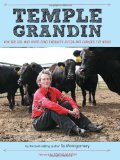
 Temple Grandin
Temple GrandinHow the Girl Who Loved Cows Embraced Autism and Changed the World
Reviewed July 22, 2012.
Houghton Mifflin Books for Children, Boston, 2012.
Starred Review
2012 Sonderbooks Standout: #8 Children's Nonfiction
Years ago, I read Temple Grandin's book for adults, Animals in Translation, and named it a 2005 Sonderbooks Stand-out. In that book, she described how being autistic has given her extra insight into how animals think, and touched off her amazing career.
This book, written for children, tells more about that amazing career. She talks about what it was like growing up autistic, and how different she was from other kids. There are plenty of pictures, including some of her drawings of ways to make slaughterhouse systems more humane.
The overall message of Temple's life is that the things that made her different from other people were the things that made her work so notable and so needed. This book is phrased to fascinate people interested in Temple Grandin's life and achievements, but also to inspire kids who feel like no one understands them. Maybe their differences are the keys to their strengths.
In an early chapter, we read:
Along with these problems, people with autism often have amazing talents. It's as if the brain makes up for deficits in one area with special gifts in others. "Autistic people have a really stellar ability to use the visual parts of the right side of the brain to compensate for problems with language processing," Dr. Minshew says. Most children take a long time to find Waldo hidden in a detailed cartoon -- but autistic children usually spot him right away. In situations like this, says Dr. Minshew, autism "may be a decided advantage!" And, these kids may be able to make friends with others who share their interests, such as art, music, computer programming, or writing.
"If I could snap my fingers and be nonautistic," Temple says today, "I wouldn't do it. It's part of who I am." One man who first heard Temple speak when he was a young soldier stationed in Denver, phoned a call-in radio show years later to talk to her. "Thank you so much," he said, "for giving me the inspiration to say that my brain's not broken. Just different."
A fascinating book about a remarkable woman.
